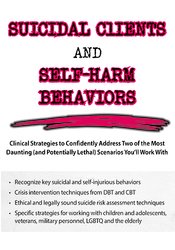Meagan N. Houston – Suicidal Clients and Self-Harm Behaviors: Clinical Strategies to Confidently Address Two of the Most Daunting (and Potentially Lethal) Scenarios You’ll Work With
Meagan N. Houston – Suicidal Clients and Self-Harm Behaviors: Clinical Strategies to Confidently Address Two of the Most Daunting (and Potentially Lethal) Scenarios You’ll Work With
- Faculty:
- Meagan N. Houston
- Duration:
- 6 Hours 2 Minutes
- Format:
- Audio and Video
- Copyright:
- Sep 13, 2018
Description
Suicidality is one of the scariest scenarios we work with. Your job literally becomes a life-or-death situation …one in which you hold a great deal of responsibility. Suicidal clients under extreme distress can leave you feeling overwhelmed and questioning your next move, and revelations of self-harm have you searching for answers they didn’t teach you in school.
- How do I differentiate self-injurious behavior from suicidal behavior?
- Can self-harming lead to suicidal behavior?
- How do I protect my license and livelihood when working with suicidal clients?
- What do I do when crises situations arise?
- When, and how, do I hospitalize clients?
Given the high probability of encountering a client considering suicide or engaging in self-harming behavior at some point in your career, the preparation of graduate programs is not enough. With so much as stake you need to be ready to skillfully assess and manage suicide risks and self-harming behavior!
Watch this candid recording and leave feeling fully equipped to address the intricacies that affect your clients’ choices to live or die. Beneficial to both seasoned and fledgling mental health practitioners, our experienced instructor will provide you with comprehensive approaches to effectively work with clients who present with suicidal and self-destructive behaviors.
Key Benefits of Watching:
- Risk assessment strategies that protect not only clients, but you as the clinician.
- Front line strategies derived from the evidence-based efficacy of CBT and DBT.
- Answers to difficult questions on suicide and self-harm that clinicians often struggle with.
- Effective treatment techniques, applicable across various populations and therapeutic settings.
- Tips on decision making that provide you with guideposts for determining when crisis intervention is needed in contrast to long-term treatment.
Go beyond grad school curriculum and get the practical real-world strategies and advice you need to confidently and capably treat suicidal and self-harming clients!
Handouts
| Manual – Suicidal Clients and Self-Harm Behaviors (3.99 MB) | 72 Pages | Available after Purchase |
| Illinois Educators Self-Study Instructions (0.02 MB) | Available after Purchase | |
| Illinois Educators Evaluation Form (0.17 MB) | Available after Purchase |
Outline
Clients at Risk:
Co-Occurring Disorders and Special Populations
- Depressive disorders
- Anxiety disorders
- Trauma and stressor related disorders
- Substance-related and addictive disorders
- Risks in special population groups
- adolescents, veterans, LGBTQ, and the elderly
The Relationship between Suicide and Self-Destructive Behavior
- Non-Suicidal Self Injury (NSSI)
- The latest research on what drives self-harming behavior
- Is self-harm an attention-seeking behavior?
- Does self-harm lead to suicide?
- The question of intent
- Maladaptive coping mechanisms and avoidance
- Clinical screening approach for NSSI
Legally Sound Suicide Risk Assessment
- 10 essential components of a thorough risk assessment
- Chronic and acute risk factors
- Distinguishing morbid ideation vs. suicidal ideation
- Imminent/chronic suicide risk
- Self-care and consultation
- Formal assessment tools for suicide
Manage Self-Harm Behaviors and Build Functional Coping Skills in Your Clients
- Dialectical Behavior Therapy
- Teach clients techniques to increase awareness of impulsive behavior
- Communication and expressing avoided emotions
- Replacement behaviors
- Research limitations and treatment risks of psychotherapeutic approaches
Suicidal Behavior Treatment Strategies: CBT, DBT and Crisis Management Skills
- Strategies to manage countertransference
- Integrate the four key elements of crisis intervention into treatment
- Strategies from CBT and DBT
- Psychopharmacological intervention and management
- Long-term care concerns and strategies
- Tele-therapy & Social media
- APA Guidelines
- Texting – should you?
- What to do when the suicidal client contacts you by phone/social media?
- Research limitations and treatment risks of psychotherapeutic approaches
When (and How) to Hospitalize Clients
- Ethical, legal implications and case studies
- Confidentiality and minor clients
- Informed consent and state-specific laws
- Voluntary vs. involuntary commitment
- When and how to use law enforcement
Please Note: PESI is not affiliated or associated with Marsha M. Linehan, PhD, ABPP, or her organizations.
Faculty
Meagan N. Houston, Ph.D., SAP Related seminars and products: 3
Meagan N. Houston, Ph.D., SAP, has specialized in providing suicide treatment in a wide variety of settings and populations for over a decade. She has experience in high-risk settings where the application of suicide prevention, assessment, and intervention occurs daily. Dr. Houston treats clients who present with a variety of psychological and behavioral disorders – which lend themselves to acute and chronic suicidality. She emphasizes the use of empirically-based approaches when conducting suicide risk assessments. She has also provided her expertise in the area of treating suicidal clients and self-harm behaviors, as the published author of Treating Suicidal Clients and Self-Harm Behaviors: Assessments, Worksheets & Guides for Interventions and Long-Term Care (PESI, 2017).
Dr. Houston is employed full time with the Houston Police Department Psychological Services Division, and maintains a part-time private practice in Houston, Texas. She has also worked in the federal prison system. In addition, Dr. Houston has provided psychological, psychoeducational, and chemical dependency programs at private practices and college counseling centers. She has also provided geropsychological services to nursing homes and rehabilitation facilities.
Speaker Disclosures:
Financial: Meagan Houston is in private practice. She receives a speaking honorarium from PESI, Inc.
Non-financial: Meagan Houston has no relevant non-financial relationship to disclose.
Shipping method
– After making a purchase, you will see a View your order link to the Downloads page. Here you can download all the files related to your order.
– In case the link is broken for any reason, please contact us and we will resend a new download link.
– If you can’t find the download link, please don’t worry about it. This course is usually available and shipped within one day
– The course you purchased will have lifetime access
– Our support staff is the best by far! Please contact us at email: [email protected] and we will be happy to help!










